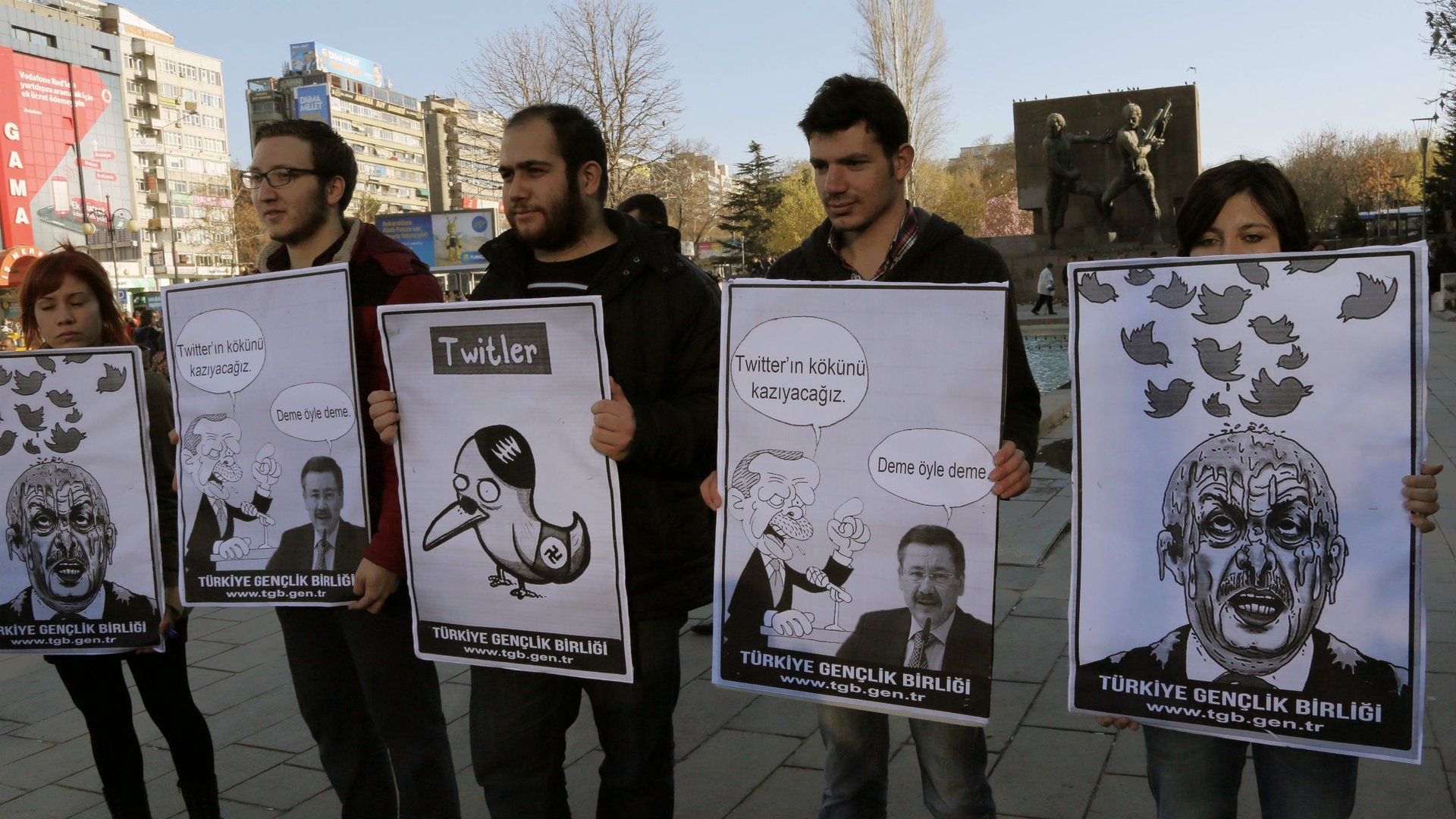A ban on Twitter hardly helps Turkey’s progressive reputation
Citing threats to Turkey’s stability, Turkey’s prime minister, Recep Tayyip Erdogan, blocked Twitter last week. The ban has failed, and boomeranged into a flood of people in the country taking to the popular social media service through encrypted connections and virtual private network software to express frustration.


Citing threats to Turkey’s stability, Turkey’s prime minister, Recep Tayyip Erdogan, blocked Twitter last week. The ban has failed, and boomeranged into a flood of people in the country taking to the popular social media service through encrypted connections and virtual private network software to express frustration.
They have lots to be frustrated about: banning Twitter diverts the country off its path of progress.
Over the past decade, Turkey has made significant economic gains. Upon taking office in 2003, Erdogan also oversaw an economic reform agenda that led to increased trade and investments, the stabilization of a previously weak and volatile Turkish lira, the taming of inflation, the growth of a middle class, and the explosion of startups and small businesses across Anatolia. The country stands among the G-20, at number 16.
Yet, for the past year, along with a series of political crises and scandals, Turkey’s economy has stalled. According to the Turkish Statistical Institute, consumer confidence has been on a steady decline since the middle of last year, dropping nearly five percent from January to February 2014. The institute anticipates a continued decrease in the overall economic situation over the near term. In December 2013, the IMF warned that Turkey, which has a sizable current account deficit, is vulnerable to a sudden slowdown.
Store managers I spoke with while visiting the country three weeks ago have complained of decreased sales. At a startup conference I attended in the Mediterranean city Antalya, Startup Turkey, many spoke about the notable absence of foreign investors.
Part of this downturn has been a result of a general global decline and response to the tapering of the US Federal Reserve’s quantitative easing (QE) program—a bond-buying program that had provided copious credit to emerging markets such as Turkey.
It is hard, however, not to blame Erdogan himself for Turkey’s backward slide for precisely that reason. Despite repeated calls for him to raise interest rates in order to prop up the Turkish currency since the spring, the Turkish prime minister held on, until the end of January, to his principle—rooted in Islam—to keep rates at zero. Islamic law prohibits an individual from making gains off of loans.
More broadly, Erdogan has also failed to take the necessary measures, including investments, to move Turkey away from growth based on consumption towards growth based on exports, particularly in high-tech products. Instead, he has become unhinged—attacking financiers, “foreign” forces, including the US ambassador to Turkey, Zionists, “neocons,” and a handful of journalists.
In June, the Erdogan government lashed out at protestors with tear gas and water cannons for resisting his efforts to raze Gezi Park, near Istanbul’s main Taksim Square. After allegations of corruptions against members of his government and close associates of his Justice and Development Party (AKP), he replaced nearly a hundred senior prosecutors and police officers. More worryingly, he reformed the law so that his office has direct oversight over Turkey’s judiciary. In January, he also pushed Parliament to pass a law that puts further controls over the Internet.
Turkey’s economy, more than ever, depends on increasing investments and innovations. This has been the primary reason the country’s leaders, particularly Turkish President Abdullah Gul, have courted Silicon Valley.
In 2012, President Gul traveled to Silicon Valley, calling on Facebook, Google, Microsoft, and Twitter. “This is the first time a Turkish president travels to the region of the US. Here is where technology that changes our lives is born,” he tweeted. He talked about the need for that same technology to flourish in Turkey. In Feb. he hosted Apple CEO Tim Cook and announced the opening of an Apple store–the first–in Istanbul sometime this year. The president also discussed the purchase iPads for Turkish school children, in a deal valued at $4.5 billion.
Erdogan’s government has made significant strides to bolster Turkish technology startups. It has extended credits to small business owners, awarded research and development grants for technology projects, and amended legislation making it easier to open a business and make investments. It has succeeded in luring a number of global technology firms to open offices in Istanbul, including Microsoft, Yelp, and Russian search engine Yandex.
Ignoring calls to invest in technology, lashing out at foreigners, censoring the Internet, and shutting down Twitter negates the gains made over the past decade. Worse, it frightens investors and potential innovators from taking a risk on the next big thing. Especially in tech, you can’t innovate if you can’t get online.
The past several days have proven that shutting down Twitter cannot silence the Turkish people. But doing so can and is dampening Turkey’s startup potential. Innovation may yield disruption. But to get there it requires openness, predictability, stability, and—as the prime minister himself forcefully declared on the day he shut down Twitter—“freedom.”